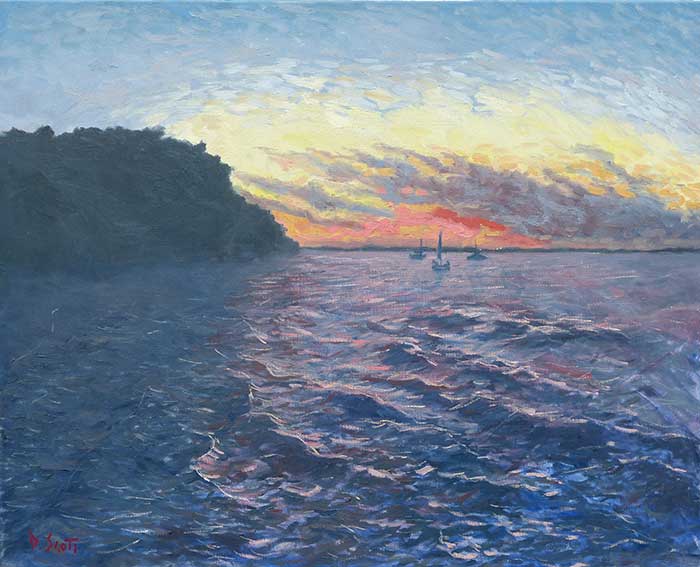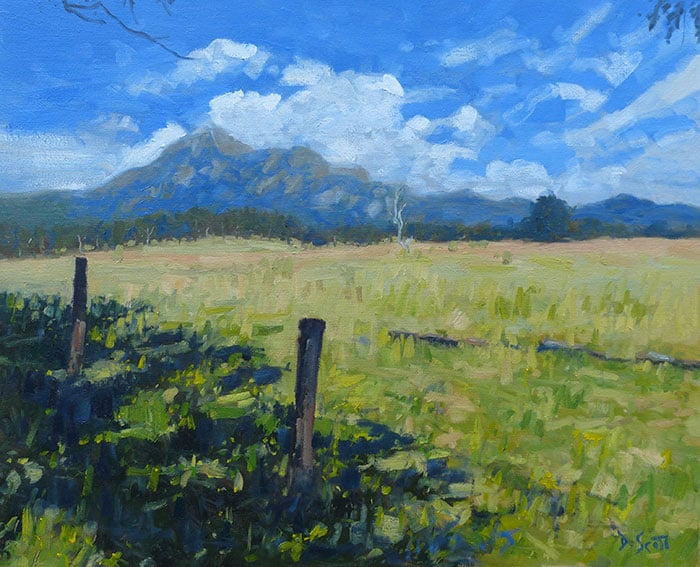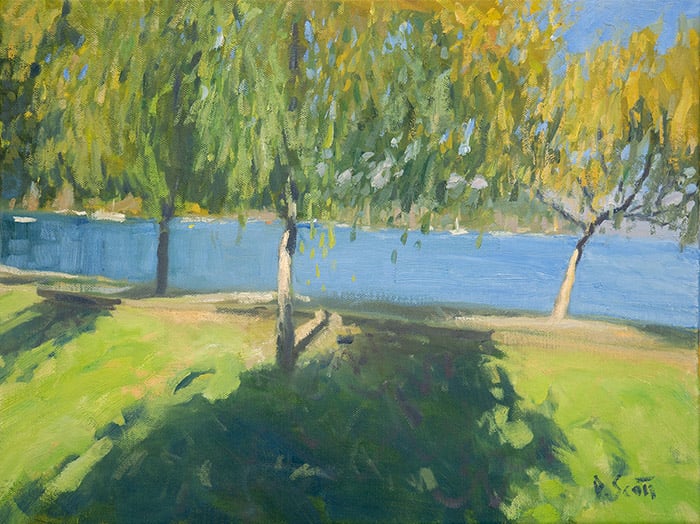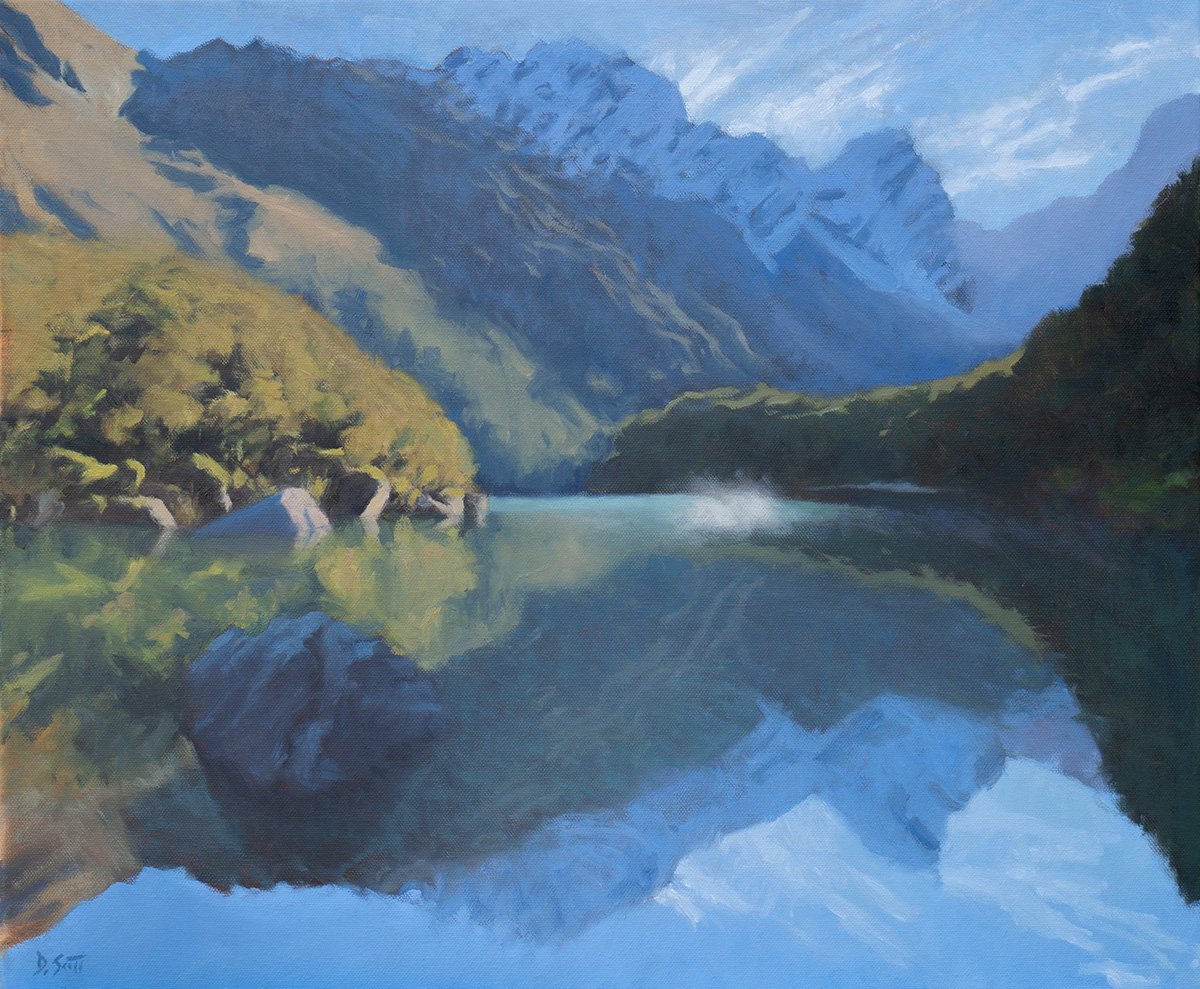Most people start their painting journey in the wrong direction. I know I sure did.
I spent my first few years aimlessly churning out paintings and drawings. Sure, I improved, but brute determination and guesswork can only get you so far. My progress gradually but surely came to a dead halt.
The problem was, I was trying to create beautiful paintings without even attempting to understand the fundamental principles and concepts of the craft. I was trying to take a shortcut, naive to the fact that there are none.
To my defense, it wasn’t really my fault. There are very few passionate and knowledgeable art teachers around. If you find one, stick to them like glue!
My greatest leaps forward came when I took a few steps back and tried to understand what was going on "behind the scenes" of painting. Things like....
- What color is and how we actually see it (you will be amazed at how many aspiring artists do not really understand this).
- How to "see" like an artist.
- What makes the great paintings so appealing.
This is fundamental stuff. Not some “secret sauce” I am claiming as my own. It has been used by generations of master artists. But for some reason, many aspiring artists are not being taught this stuff.
In the five years of high school art, there was not a single mention of color theory, value, composition, or any of the other fundamental aspects of painting.
These should be the first things we are taught, not things we accidentally stumble upon (if we are lucky) after many years of guesswork and frustration.
That is why I created Painting Academy: The Fundamentals. This is exactly what I needed back when I was learning how to paint, many years ago.
No guesswork, no gimmicks, no shortcuts. Just fundamental information which will help you build a rock-solid painting foundation.
This is the kind of information which will benefit every single stroke you make on the canvas.

What You Will Learn
Module 1: Getting Started
The first module will get your toes wet. Any questions you have regarding supplies, mediums, mindset, problem-solving, etc. will be dealt with here.

Module 2 - Understanding Value (Light and Shadow)
There is a reason why almost every single decent artist mentions value (how light or dark a color is) as being one of the most essential aspects of painting. If you are able to paint with accurate values, then most of the hard work is done!
Many artists can talk about value, but very few can actually use it properly. In this module, you will learn:
- Exactly what value means and why it is so important for realistic paintings.
- How to “see” value, without getting confused by all the other elements.
- How to use value to create a sense of harmony and coherence throughout your painting.
- Practical tips for calibrating your judgment of value over time. Your judgment is the single greatest weapon you possess as an artist, if you calibrate it properly.

Module 3 - Color and Light
Color is a complex but fascinating area in painting. If you are good with color, you could build your entire art career around that skill (even if you are lacking in other areas).
- What color actually is and how we see it (I am amazed at how many people try to paint without understanding this).
- The limitations of our paints (why you simply cannot mix certain colors you see).
- The color illusions you must be careful of (color is not always as it seems).
- The number one cause of “muddy colors” and how to avoid them.
- How to use color saturation to make your colors “pop”, but not overpower your painting.
- The number one thing which unites all the colors we see.

Module 4 - Color Mixing, Manipulating, and Harmony
Understanding the theory is only one part of the story. You need to actually use and apply the theory to painting. I know so many artists who could write a thesis on color, but are unable to translate that knowledge onto the canvas.
- What colors you should have on your palette.
- How to identify and mix colors you see.
- The three questions you need to know for mixing colors.
- A simple technique to make the colors in your paintings “vibrate”.
- How to take full advantage of grays and other dull colors (most artists are underutilizing the potential of these colors).
- What the popular color schemes are and why you should not rely on them.
- How to create color harmony in your painting.

Module 5 - Creating Interesting Compositions
Composition is a notoriously gray area in painting. Many people seem to know what a great composition is when they see it, but good luck getting them to explain why.
- What composition actually means and how you should think about it.
- The two most important questions you need to ask for designing great compositions.
- What the building blocks of a painting are and the principles which bind them.
- How to use the rule of thirds to help you design more interesting and balanced compositions.
- Why you need to be careful of composition "rules" and theories.
- How to use cropping to strengthen your composition and trim the clutter.
- How to create subtle yet powerful links between distinct areas in your painting.
- How to emphasize your big idea.

Module 6 - The Painting Process
I bring it all together in this final module. You will watch over my shoulder as I construct a painting from start to finish.
- How to turn an idea into a painting.
- How to start a painting.
- Why you should “kill the white” of the canvas.
- How to identify and fix mistakes.
- How to make everything work together (this is one of the biggest yet most understated challenges of painting—it doesn’t matter if you paint one area well, if it does not fit in with the rest of the painting).

Resource Library
You will also get access to a goldmine of valuable resources to help you on your painting journey—useful websites, master artists to follow, questions to ask, checklists, etc.
"For me, the course easily paid for itself in the resources section alone." Rodger S.
44 videos (4+ hours of content)
PDF workbooks, text modules, quizzes, checklists, cheat sheets, reference photos, downloads, and much more.
Special accountability emails to help guide you through the course.
Get off the Painting Hamster Wheel
If you feel like you are busy churning out painting after painting, but not improving, stop!
Take a step back. Painting more is not the answer.
There is a reason why so many aspiring artists get stuck at the hobby level. Passion is usually not the problem (we artists are a passionate bunch). The problem is they are trying to learn using a hope strategy; that is, they create painting after painting and hope they will learn something new.
Even if you have absolutely no intention of painting being anything but a hobby, I still encourage you to put your best foot forward and try to learn correctly. Painting is much more enjoyable when you understand it.

A Note for Those of You Who Have Never Painted Before
The good news is you are a completely blank slate. You can start your journey on the right track. Make sure you use this to your advantage. You are doing yourself a serious disservice if you try and jump the queue and skip the fundamental aspects of painting.
You don’t have to learn from me. But whatever you do, don’t put your head in the sand and try to guess your way through.
I will say it again... painting is MUCH more enjoyable when you actually understand what is going on.
It is the same as music—if you don’t play any instruments or understand what goes on behind the music which hits your ears, then you will struggle to appreciate the remarkable talent and beauty of a concerto by Beethoven.
The first few years of painting are hard, but it will be worth it. There is something magical about seeing your vision actually come to life on the canvas; watching as your hand effortlessly makes the strokes you want it to make; being on the better end of compliments from others who wished they could do the same.

Become a Great Decision-Maker
Stop tunnel-visioning “how to paint this and that”, and start learning how to make great decisions. After all, the master painters are really just master decision-makers and problem solvers.
Painting is not a linear process. Rather, it is a long string of problems you need to solve.
What ends up on your canvas depends on the decisions you make along the way. A few wrong turns and it’s back to the drawing board.
I cannot give you the answers to every problem you will encounter. But I can give you the tools to solve the problems yourself.
If you're ready, let’s get started!
Enroll for a One-Time Payment of $97USD
(Or two monthly payments of $50)

Over 5,700 aspiring artists from around the world have taken this course. Here's what some of them had to say:
"Hi Dan,
I just wanted to say thank you for the course – I am only part way through but I think it’s wonderful so far. There are so many poor quality courses (“paint like me” or “watch me paint”) online and it’s clear you have put in so much effort to offer a true quality course. The information is very in-depth and well thought out/presented. My style is very different from yours (I use mainly gouache paints and my work is a little more stylised/graphic) but I am still finding it very useful."
Kindest regards, (fellow QLD artist) - Mary Lawson
"Dear Dan,
A quick note with sincere thanks for your Academy course I subscribed to. I love it!
Enjoying and taking in every word. Since I am retired, my life is busier than when I was otherwise occupied, so my time is limited, at times.
I’m doing the course slowly in between my travel etc.
I want to THANK You for putting such a detailed instructional course together. I, also, read everything you send,
Big thank you again, you are an amazing teacher." - Donna Macleod-Hardstaff
"Dear Dan,
Greetings from Perth! I wish to share how I am enjoying the course so much! This course is so helpful to give positive and engaging direction concerning the basic and developing fundamentals of good art practice and learning. I have the opportunity to explore what I really need and want to know which I could not experience so well until now. Even when studying fine art at University and other small private art teaching places, much of the starting blocks of art were missing. Yet with your course, I feel a wonderful communication to the student. I am thankful for your sharing of your study, research and experience in a generous and open way. I am very grateful to you!
With every best wish" - Kim Morrison
"This has been an excellent training course. I’ve learned so much. It’s gratifying to understand how things work and why instead of painting by instinct. Trial and error. I can now paint with intentionality and purpose.
Thanks so much!" - Mary Lu
"Hi Dan,
I am about half way through the academy course right now, I am really enjoying it and I just want to say a great big thank you for getting my creative juices flowing again, I am an impatient kind of guy so have already put brush to canvas employing some of your tips already...
Again a huge thank you for your inspiration." - Neil Hodgson
"Dear Dan
I can't thank you enough for your art course. It has been invaluable to me and given me the theoretical tools to change the way I approach my work. I've still to put into practice the lessons I have learned. It won't be easy but I look forward to the journey.
With my heartfelt gratitude" - Lucy Harington
"Dan,
I just completed my first “intensive” and have wrapped myself into each element of the guidance you have shared!
The cementing of the ideas with reference to actual paintings is an inspired teaching technique.
Thanks so much…. Right now I feel like I have been drinking out of a fire hose. . . As I move into practicing and applying these thoughts I will undoubtedly be reading and absorbing time and again." - Dwight Richardson

Frequently Asked Questions

My 100% Guarantee
Your satisfaction is my number one priority. If for any reason you do not enjoy the course, just send me an email within 60 days of purchase and I will refund you in full.
Enroll for a One-Time Payment of $97USD
(Or two monthly payments of $50)
Hope to see you in the first lesson! If you have any questions, you can email me at admin@drawpaintacademy.com.
